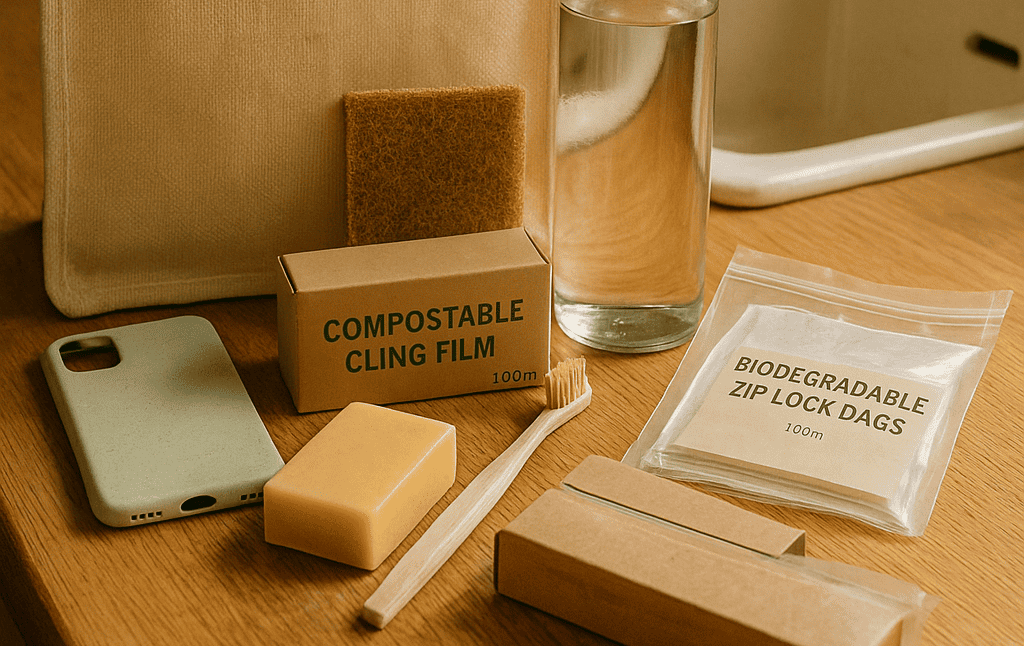Eco-Friendly Living
What Makes a Product Truly Eco-Friendly?
Introduction
Eco-friendly. Sustainable. Green. These words are everywhere now, especially in UK shops and online stores. But what do they actually mean? And how can you tell if a product is truly eco-friendly and not just clever marketing? In this guide, we’ll break it all down in simple terms, helping you make informed, planet-friendly choices for your daily essentials.
TL;DR: This article provides a practical checklist for what makes a product genuinely eco-friendly, including sustainable materials, minimal/plastic-free packaging, design for reuse or composting, ethical manufacturing, and clear end-of-life options. It explains the difference between “eco-friendly” and “sustainable”, warns against greenwashing, and offers guidance for UK consumers seeking to make more informed daily choices.
The Rise of Eco-Friendly Products in the UK
As awareness of plastic pollution, climate change, and waste grows, more UK shoppers are seeking eco-friendly products. From reusable water bottles to compostable kitchen sponges, the options are endless. But with so many choices, it’s crucial to separate the truly sustainable from the greenwashing.
Why It’s Important to Understand What Eco-Friendly Means
Not every product labelled “eco” or “green” lives up to the hype. Some brands use these terms loosely to appeal to conscious consumers without actually offering sustainable solutions.
Avoiding the Greenwashing Trap
Greenwashing is when companies make products appear eco-friendly without real environmental benefits. Learning what makes a product truly eco-friendly helps you avoid being misled.
What is Eco-Friendly?
Breaking Down the Term
“Eco-friendly” means a product is designed to have minimal impact on the environment. This could mean using renewable materials, reducing waste, or ensuring the product is biodegradable or recyclable.
Common Misconceptions About Eco-Friendly Products
- Myth: Eco-friendly always means expensive.
- Myth: Biodegradable means you can toss it anywhere.
- Myth: All natural materials are automatically sustainable.
Eco-Friendly vs Sustainable—Key Differences
Eco-friendly focuses on reducing harm to the environment.
Sustainability considers the long-term ability to produce or consume without depleting resources or causing irreversible damage. Ideally, products should be both.
The 5 Key Features of a Truly Eco-Friendly Product
1. Made from Sustainable or Renewable Materials
Look for products made from:
- Bamboo
- Organic cotton
- Wheat straw
- Recycled materials
These resources regenerate quickly and don’t contribute to deforestation or pollution.
2. Minimal or Plastic-Free Packaging
Excessive plastic packaging defeats the purpose. Truly eco-friendly brands use:
- Compostable or recyclable packaging
- Minimalistic, no-frills designs
- Recycled cardboard or paper wrapping
3. Designed for Reuse, Durability or Compostability
Products should be built to last or break down naturally. Think:
- Reusable bags
- Compostable zip-lock bags
- Bamboo toothbrushes with biodegradable handles
4. Ethical Manufacturing and Fair Labour Practices
Sustainability includes how products are made. Ethical brands prioritise:
- Fair wages
- Safe working conditions
- Environmentally responsible production
5. End-of-Life Considerations (Recyclable or Biodegradable)
A product’s eco-friendliness extends to its disposal. Look for:
- Compostable materials
- Recyclable parts
- Brands offering take-back or recycling schemes
Examples of Eco-Friendly Products UK Shoppers Love
- Reusable Shopping Bags – Cotton, jute, or recycled materials
- Bamboo Toothbrushes – Biodegradable handles, recyclable bristles
- Compostable Cling Film & Zip Lock Bags – Plant-based, home-compostable
- PLA / PBAT Phone Cases – Durable, biodegradable alternative to plastic
- Bar Soaps & Solid Shampoo Bars – Plastic-free, long-lasting
What is Eco-Friendly? A Deeper Look
It’s More Than Just the Materials
A bamboo product isn’t eco-friendly if it’s over-packaged or shipped halfway around the world unnecessarily. Consider the bigger picture.
The Product’s Full Lifecycle
From production to disposal, every stage matters. A truly eco-friendly product:
- Uses minimal resources
- Reduces pollution during production
- Leaves little to no waste at the end
Reducing Carbon Footprint and Waste
Eco products should contribute to:
- Less energy is used in production
- Lower transportation emissions
- Reduced landfill waste
Spotting Greenwashing: How to Avoid Fake Eco Claims
Look for Certifications
Trustworthy labels include:
- FSC (Forestry Stewardship Council)
- Compostable or Home Compostable symbols
- Fair Trade or B Corp Certifications
Watch for Vague Buzzwords
Words like “natural,” “eco,” or “green” without clear evidence? Red flag.
Research the Brand’s Values and Practices
Check if they:
- Share supply chain information
- Use transparent materials lists
- Offer clear recycling or disposal instructions
How to Choose Sustainable Daily Essentials
Start with the Basics (Kitchen, Bathroom, On-the-Go)
Focus on high-waste areas:
- Swap plastic wrap for compostable cling film
- Use bamboo toothbrushes
- Switch to solid toiletries
- Carry reusable water bottles and coffee cups
Look for Local, UK-Based Brands
Buying locally reduces transport emissions and supports ethical UK businesses. Trusted names include:
- BoringBasics.uk – Affordable eco swaps for daily life
- Wave Case UK – Biodegradable phone cases
- Friendly Soap – Plastic-free toiletries
Prioritise Products That Replace Single-Use Plastics
Small swaps with big impact:
- Reusable bags
- Compostable sponges
- Biodegradable zip-lock bags
Benefits of Switching to Truly Eco-Friendly Products
Environmental Benefits
- Reduces plastic pollution
- Conserves resources
- Lowers carbon emissions
Health and Safety Benefits
- Fewer toxins in your home
- Natural materials over harmful chemicals
- Safer alternatives for you and your family
Supporting Ethical UK Businesses
Your purchase fuels positive change by:
- Boosting local economies
- Supporting sustainable innovation
- Driving demand for greener products
Conclusion
Truly eco-friendly products go beyond clever marketing. By understanding what makes a product genuinely sustainable, you can make smarter choices that benefit the planet, your health, and ethical UK businesses. Start small, stay curious, and remember—every swap adds up to real change.

